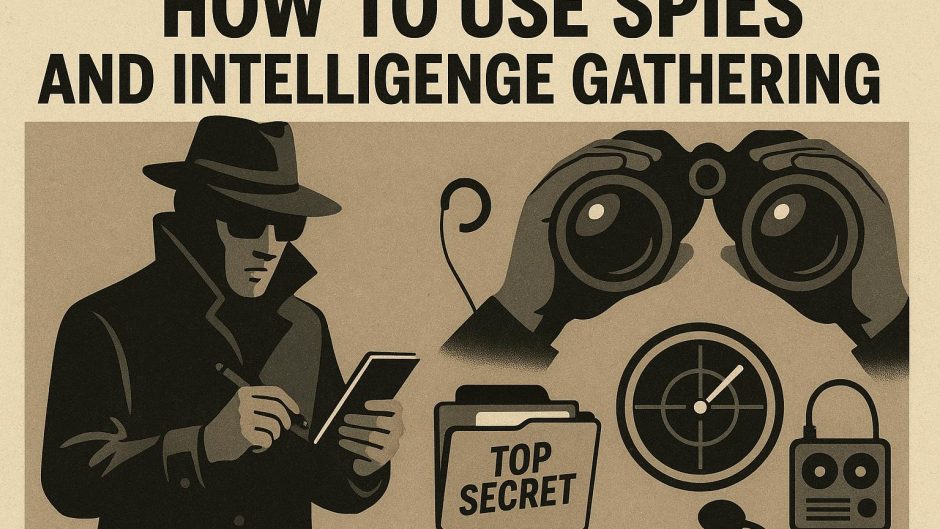Introduction to Spies and Intelligence Gathering
The art of intelligence gathering has been a critical component of statecraft and security operations for centuries. This article explores the practical aspects of using spies and implementing intelligence-gathering techniques, focusing on factual information.
Understanding the Role of Spies
Spies are individuals engaged in covert operations to obtain sensitive information from a target organization or state. Their main objective is to gather intelligence that can inform decision-making processes.
Types of Spies: Different types of spies can be utilized depending on the mission objectives:
Field Agents: These individuals operate on the ground to collect information directly from the source. Their roles require them to immerse themselves within a target group to retrieve critical information that might not be accessible through technological means. Field agents need to be adept in clandestine operations and subtle communication techniques.
Double Agents: Double agents operate under the guise of working for one organization while secretly loyal to another. This duality allows them to feed false information to their ostensible employers while acquiring valuable intelligence for the entity they are truly committed to. The recruitment and management of double agents require precise psychological evaluation to ensure their loyalty and effectiveness.
Informants: Provide occasional or circumstantial intelligence based on their access to valuable information. They are often individuals who do not engage in espionage as a full-time profession but possess situational access to important data. Handling informants involves building trust and providing incentives that effectively encourage the sharing of information.
Methods of Intelligence Gathering
Intelligence gathering consists of several techniques, each suited to specific needs and circumstances. These methods can be broadly categorized into two main types: human and technical intelligence.
Human Intelligence (HUMINT): This category involves data collection through human interaction. HUMINT is a traditional method that relies heavily on personal relationships and direct contacts. The process often includes:
– Creating a network of sources who are in valuable positions. These networks enable handlers to gain access to sensitive environments where direct observation or participation is critical for intelligence gathering.
– Conducting clandestine meetings to exchange information. Such meetings are often risky and require careful planning to prevent detection, ensuring that the communication between parties is secure and discreet.
Technical Intelligence (TECHINT): In contrast, technical intelligence incorporates modern technological advancements to collect data. This category is continually evolving with technological breakthroughs and includes:
– Signal Intelligence (SIGINT): This involves intercepting electronic communications, such as phone calls and emails, to gather information. SIGINT operations require sophisticated technology to monitor these communications without detection.
– Imagery Intelligence (IMINT): Utilizes satellites and aerial photography to gain visual information about locations, missile sites, troop movements, and other potential threats. The ability to analyze images for valuable insights is a key competence in IMINT.
– Cyber Intelligence: Focuses on gathering intelligence and conducting surveillance over digital networks. This field has grown in importance with the rise of cybersecurity threats. Cyber intelligence operations involve monitoring online communications, hacking, and safeguarding digital infrastructures against breaches.
The Importance of Counterintelligence
While gathering intelligence is crucial, protecting it from adversaries is equally important. Counterintelligence involves strategies and activities aimed at preventing espionage, sabotage, and other intelligence threats.
Key Aspects of Counterintelligence:
– Identifying and neutralizing threats posed by foreign intelligence services: This involves rigorous surveillance to identify potentially hostile entities and taking measures to neutralize these threats.
– Ensuring the security of sensitive information through encryption and secure communication channels: This is vital to prevent unauthorized access to classified data. Advanced encryption protocols and secure lines of communication are employed to protect the integrity of sensitive information.
– Conducting background checks and vetting personnel with access to classified information: This minimizes the risk of insider threats by ensuring that only trustworthy and reliable individuals are granted access to sensitive systems and data.
Ethical Considerations in Intelligence Gathering
Despite its importance, intelligence gathering raises several ethical concerns that must be addressed. These include complex situations where ethical and legal boundaries are put to the test. Crucial considerations involve:
– The balance between national security and individual privacy rights: Intelligence operations must navigate the fine line between maintaining security and respecting personal freedoms. Missteps in this area can lead to public outcry and loss of trust in government agencies.
– Ensuring compliance with international laws and treaties: Intelligence agencies operate within an international legal framework that prohibits certain actions. Maintaining compliance is essential to uphold a nation’s reputation on the global stage.
– The moral implications of espionage activities: Espionage can involve deceit, manipulation, and activities that may raise moral questions. Those involved must grapple with the ethical impact of their actions and potential consequences on society.
For further reading, numerous dedicated resources and official sites provide deeper insights into intelligence practices and historical case studies, such as books, official intelligence agencies’ websites, and expert analyses.
In summary, the effective use of spies and intelligence gathering requires a combination of human skill and technological capability, underscored by a sound counterintelligence framework. Understanding and addressing ethical considerations remains a critical component of this field.
This article was last updated on: September 23, 2025






Recent Comments